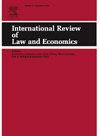政府什么时候攻击司法?政治腐败的解释力
IF 1
3区 社会学
Q3 ECONOMICS
引用次数: 0
摘要
近几十年来,世界目睹了民选政府口头攻击司法机构、指责法官有偏见或声称法院裁决有政治动机的各种例子。尽管这种限制法院的做法很普遍,但我们对政府究竟何时决定口头攻击司法机构知之甚少。关注政治腐败的影响,本研究的目的是了解1)腐败是否以及如果存在,腐败如何影响政府对司法机构的攻击;2)腐败是否以及如果存在,其影响如何在不同的政治背景下发生变化。我们认为,在拥有完全或部分独立媒体的国家,对司法机构的口头攻击会随着腐败程度的增加而增加。然而,在媒体不独立的政权中,政治腐败不会对攻击司法系统产生重大影响。我们对165个国家(1991-2022)进行了时间序列横断面分析,以检验我们的假设。实证结果支持我们的假设。为了更好地理解腐败和媒体独立共同引发政府对司法机构的口头攻击的因果机制,我们在研究的第二部分比较了阿根廷、巴西和委内瑞拉的案例。本文章由计算机程序翻译,如有差异,请以英文原文为准。
When do governments attack the judiciary? The explanatory power of political corruption
In recent decades, the world has witnessed various examples of elected governments verbally attacking the judiciary, accusing judges of bias, or claiming that court decisions are politically motivated. Despite the prevalence of such court-curbing practices, we know very little about when exactly governments decide to verbally attack the judiciary. Focusing on the effect of political corruption, the objective of this study is to understand 1) whether and, if so, how corruption affects governments’ attacks on the judiciary and 2) whether and, if so, how its effect changes across different political contexts. We argue that in countries with fully or partially independent media, verbal attacks on the judiciary would increase with the level of corruption. However, in regimes where the media is not independent, political corruption would not have a significant effect on attacks on the judiciary. We conduct a time-series cross-sectional analysis across 165 countries (1991–2022) to test our hypotheses. The empirical results support our hypotheses. To better understand the causal mechanisms through which corruption and media independence together trigger governments’ verbal attacks on the judiciary, we compare the cases of Argentina, Brazil, and Venezuela in the second part of the study.
求助全文
通过发布文献求助,成功后即可免费获取论文全文。
去求助
来源期刊
CiteScore
2.60
自引率
18.20%
发文量
38
审稿时长
48 days
期刊介绍:
The International Review of Law and Economics provides a forum for interdisciplinary research at the interface of law and economics. IRLE is international in scope and audience and particularly welcomes both theoretical and empirical papers on comparative law and economics, globalization and legal harmonization, and the endogenous emergence of legal institutions, in addition to more traditional legal topics.

 求助内容:
求助内容: 应助结果提醒方式:
应助结果提醒方式:


